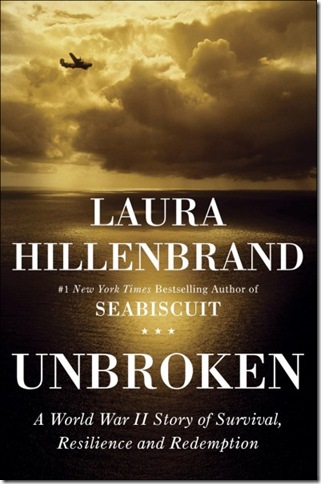For weeks, Unbroken has been perched at or near the top of the nonfiction best-seller list, and for good reason.
The book tells the riveting story of a World War II airman who survived for 47 days in 1943 on a raft in the Pacific Ocean before Japanese soldiers captured him and held him in brutal conditions for the rest of the war.
The airman, Louis Zamperini, was a world-class runner who expected to compete in the 1940 Olympics when war sabotaged his athletic dreams. He joined the military and was assigned to a B-24 crew in the Pacific. During a search mission an engine failed, and his plane plunged into the ocean. Most crew members were killed, but Zamperini and two others survived.
Unbroken grabs readers from the first page because of Laura Hillenbrand’s obvious passion, compelling writing, and use of telling details to bring the story to life.
Hillenbrand puts us on the raft as the survivors struggle to stay alive. “The equatorial sun lay upon the men, scalding their skin,” she writes. “Their upper lips burned and cracked, ballooning so dramatically that they obstructed their nostrils, while their lower lips bulged against their chins.” Sharks circled and violent storms tossed the raft into the air. The starving men survived on birds, fish, small sharks and rainwater.
One of the three surviving airmen died on the raft, and Japanese soldiers captured the others after they had drifted 2,000 miles. Hillenbrand details the horrific treatment endured by prisoners of war in Japanese concentration camps. One particularly brutal soldier, Mutsuhiro Watanabe, would run among the POWs and club every man he saw, “fracturing their windpipes, rupturing their eardrums, shattering their teeth, tearing one man’s ear half off, leaving men unconscious.”
Watanabe took a special interest in Zamperini, springing on him “randomly, every day, pounding his face and head.” He ordered Zamperini to care for the camp’s pig by cleaning up its excrement with his bare hands. Zamperini ate the pig’s food to survive.
Hillenbrand expertly weaves into the story background on the war and Japan’s belief that it had a divine right to rule over all of Asia. Japanese soldiers and civilians saw their enemies as “brutish, subhuman beasts or fearsome ‘Anglo-Saxon devils.’ ”
Treatment of prisoners of war was so harsh that tens of thousands died in captivity, Hillenbrand writes. Many who survived returned home with grievous injuries and illnesses. A huge percentage suffered from crippling post-traumatic stress disorder.
The book’s description of the devastating psychic aftermath of war is relevant today because thousands of men and women are returning from Iraq and Afghanistan with staggering physical and mental ailments.
Back home in California, Zamperini suffered from extreme anxiety and random rage, and soon drifted into alcoholism. He married, but the couple fought over his wild behavior. In one scary nightmare Zamperini saw himself straddling Mutsuhiro Watanabe and strangling him, but in fact he was strangling his pregnant wife on their bedroom floor. She screamed in terror, and he woke up.
Zamperini fixated on returning to Japan so he could seek out and kill Watanabe, but in another remarkable story twist, Zamperini’s wife persuaded him to attend a Billy Graham crusade, where the suffering soldier experienced a conversion to Jesus. He gave up alcohol, founded a non-profit boys’ camp, became a Christian speaker, and forgave the man who had tortured him.
 I have one quibble. Unbroken occasionally is repetitive as Hillenbrand catalogues Japan’s unconscionable treatment of POWs. The mind becomes numb, trying to absorb so much horror. But overall Unbroken is a masterful, well-told account of an important slice of World War II.
I have one quibble. Unbroken occasionally is repetitive as Hillenbrand catalogues Japan’s unconscionable treatment of POWs. The mind becomes numb, trying to absorb so much horror. But overall Unbroken is a masterful, well-told account of an important slice of World War II.
Hillenbrand previously wrote Seabiscuit, the best-selling story of a race horse that later became a successful movie. One can safely bet that Unbroken will appear on the big screen, too.
One of the most remarkable aspects of both Seabiscuit and Unbroken is that Hillenbrand was able to write a book at all. She has suffered for years from crippling chronic fatigue syndrome, and rarely leaves her Washington, D.C., home. She has never met Zamperini, who lives in California, although she interviewed him scores of times by phone.
Readers can hope that one day Hillenbrand will use her superb writing skills to pen a memoir about her own remarkable life.
Unbroken: A World War II Story of Survival, Resilience, and Redemption, by Laura Hillenbrand, Random House, 473 pp., $27
Bill Williams is a freelance writer in West Hartford, Conn., and a former editorial writer for The Hartford Courant. He is a member of the National Book Critics Circle and can be reached at billwaw@comcast.net.
